By Seth Newton
I’m a rancher near Glendive, and I live just downstream from Montana’s first radioactive oil waste facility.
What’s radioactive oil waste? During the drilling process, radioactive material buried within the earth is brought to the surface. Oil and gas producers end up not only with oil and natural gas, but also with radioactive produced water, sludge, filter socks, and even radioactive pipes and processing equipment.
It’s not the product they bargained for. It’s also a particularly tough one to get rid of. You can’t bury it onsite, nor can you bury it at any landfills in North Dakota.
When the Bakken was booming, North Dakota’s state laws prohibited the disposal of radioactive oil waste. With oil waste quickly piling up, producers were desperate for disposal options. Many of them were caught dumping it illegally. Others were paying an arm and a leg to ship it far out of state. Before long, they turned to Montana, and built a waste facility just over the border — in Glendive, in my back yard.
Unlike North Dakota, Montana doesn’t have state laws on radioactive oil waste. Radioactive oil waste also was exempted from federal hazardous waste standards. Most states have stepped in to fill that gap themselves, by putting their own protections in place. But not Montana. Here, farmers, ranchers, and landowners are on our own. If something goes wrong, the law’s not on our side.
Four years as a radioactive dump
The radioactive waste facility outside of Glendive has been trucking in radioactive oil waste and burying it here for four years. In the meantime, North Dakota laws have changed. Opening a radioactive oil waste facility is legal there now. But there are still no permitted radioactive oil waste facilities anywhere in that state. So North Dakota remains a disposal desert, while nearly all of the Bakken’s radioactive oil waste ends up in Eastern Montana.
If we’re the main destination for Bakken oil waste, why don’t we have any protections on the books? Instead, all we’ve got is a set of unenforceable “policy guidelines” published by the Department of Environmental Quality. We need something tangible, something in black and white — not just “guidelines” that will shift in their interpretation.
The way I see it, accepting radioactive waste into our state without having any laws that protect our land and water is a colossal blunder. I’m in ranching for the long haul. I’d like to see some protections in place to ensure that will remain possible and that will keep my land and water viable far into the future.
Rules should reflect best practices
There’s a way to dispose of this oil waste that follows best practices, protects our water, and safeguards human health. But if we don’t have protections on the books — protections that specify how waste should be measured, how water should be tested, where that data goes, and how inspections are conducted — we’re flying blind. Going without these protections leaves our livelihoods in the hands of out-of-state companies that couldn’t care less about our farms, ranches, and communities.
Montanans deserve formal rules that would protect landowners from any threat to our land, water, and livelihoods, and keep eastern Montana safe and viable for agricultural production.
This is land that matters. Eastern Montana should not be North Dakota’s dumping ground. But we will be, as long as we remain the “wild west” of radioactive waste disposal. Join me in reminding Montana DEQ that we deserve formal protections, and that we have waited long enough. Email your concerns to DEQWUTMBRules@mt.gov.
Seth Newton is a Glendive-area rancher and member of Northern Plains Resource Council. Reprinted from Plains Speaking.
Information on oil and gas radioactive waste
-
No Time to Waste, a WORC report finding that the storage, transport, and disposal of radioactive oil and gas field waste in the West are vastly under-regulated.
- WORC’s Oil and Gas Waste Mapping Project shows the oil and gas waste stream Colorado, Montana, North Dakota, and Wyoming.
Sign up for WORC blogs
WORC will send you a notice of new blog posts. You can sign up here.

